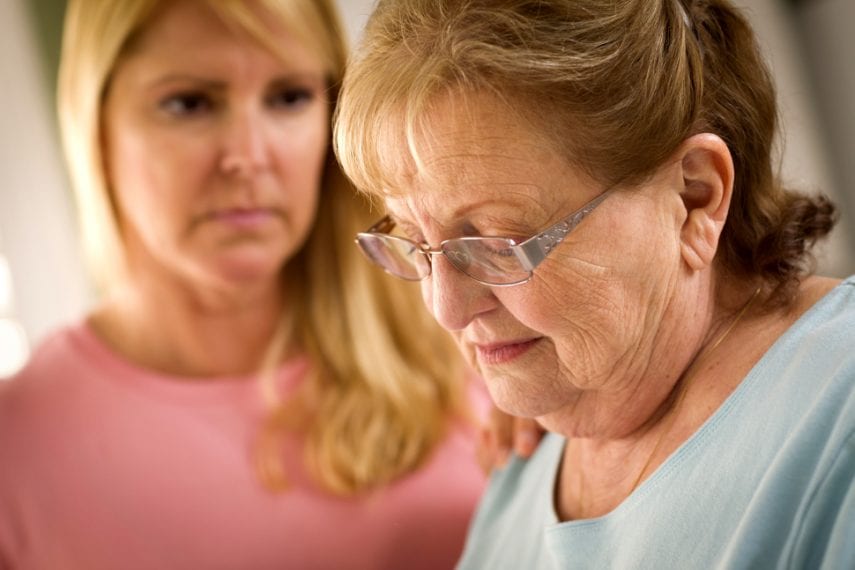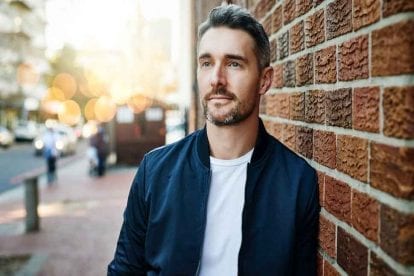“Is My Mother Addicted to Prescription Drugs?” What to Do if You Suspect Your Parent is Addicted

Taking increasingly larger doses of medication. Obsession with getting more drugs. Acting “high” or heavily medicated. If you’ve been observing this type of behavior, you may be wondering, “Is my mother addicted to prescription drugs?” If you’re looking for a way to help a parent addicted to prescription drugs, a residential treatment facility can give them the care they need to get clean and begin recovery. Read this post to learn the signs of prescription drug abuse, and what your parent needs to heal. You only get one mother or father. Help them begin the healing process today.
Barbara and her daughter Lynn had always been close. But when Barbara developed panic attacks, she started to become isolated from her daughter. She grew afraid of leaving her house, driving, and was even nervous about answering the phone if she didn’t know the caller. Her daughter Lynn drove her to their family doctor, who prescribed Xanax. It seemed to relax Barbara, so everyone thought the medicine was doing her some good.
But after awhile, Barbara was taking too much Xanax. Lynn noticed her mother was always running out of her prescription, and soon realized she had seen a second doctor to get a second prescription. One day she was surprised to see her mother crushing up her pills into a fine powder. When asked, Barbara said that snorting the drug made it work faster. It all seemed suspicious to Lynn, who eventually told their family doctor about the strange behavior. He referred Barbara to a residential treatment facility right away.
Our parents protect us from harm all our lives. But when they’re the ones who are struggling, it becomes our jobs to step in to care for them. We all want to see our parents healthy, happy and strong and know that as they age, they are likely to have an increased number of drug prescriptions to help keep them that way. But what happens when parents use prescription drugs in ways that do not follow the manner in which they were prescribed? What if they’re taking drugs they do not have a prescription for? If you see a parent misusing medications in either of these ways, you’re right to be concerned.
How can you tell the difference between regular use and addiction? And when is it time to get your parent help? It’s important to know the signs of prescription drug abuse, as it is not uncommon in mid-life or elderly people. If you think your parent may be using prescription drugs in order to “get high”—or feel a sense of euphoria—they may be battling prescription drug abuse. Luckily, there is effective treatment available that can turn your parent’s life around, even if they are in their golden years. And that recovery starts by recognizing signs of prescription drug abuse and getting them into appropriate treatment.
Is My Mother Addicted to Prescription Drugs?
Few things are as unsettling as watching your mother or father behave as though they’re addicted to a drug, but you must face the signs. Specific drugs have their own dependency symptoms, but there are some universal similarities. If your parent shows any of these behaviors, you should consider learning more about what prescription drugs they are currently taking.
- Taking larger doses than what the doctor has prescribed
- Stealing, trading or selling prescription drugs
- Misplacing or losing prescriptions so that more must be written
- Visiting several doctors to collect prescriptions
- Seeming high: sedated, hyperactive or “out of it”
- Increased irritability, mood swings or hostility
- Interrupted sleep patterns, such as insomnia or oversleeping
- An inability to make decisions
If your parent is dependent on prescription drugs, they will most likely be addicted to any of these three classes of drugs.
- Opioids: Painkillers, such as OxyContin or Vicodin. Symptoms of opioid use and abuse include sedate sleepiness, or “nodding”, shallow breathing and chronic constipation. Withdrawal symptoms are flu-like.
- Depressants: Used for relaxation and to calm muscles, these drugs include benzodiazepines like Xanax and Ambien. Symptoms of depressant intoxication include drowsiness, slurred speech, lack of coordination or lack of inhibition.
- Stimulants: Drugs used to treat conditions like attention-deficit hyperactivity disorder or narcolepsy, stimulants include Adderall and Ritalin. Signs of use involve hyperactivity, restlessness, dilated pupils and increased blood pressure and heart rate.
Do you know which drug your parent may be dependant upon? You may have your suspicions that are hard to confirm. Talking to them and asking questions in a non-accusatory way may get them to open up. Do you know what medications they have taken in the past? The more you know about a parent’s medical history the easier it will be to understand unusual new behavior. For example, if a parent had a physical injury, it’s possible they became addicted to opioids initially prescribed for pain management. If they suffer from severe anxiety they may have been prescribed benzodiazepines, causing behavior similar to alcohol intoxication.
Your parent may be reluctant to open up to you, or become irritable or even hostile. If this happens, try not to take anything they say to heart and don’t give up. It’s hard for someone to face their addiction and they may be in denial. Remember, it’s the addiction that has changed their behavior, hiding their true selves behind a vicious cycle of highs, crashes, and withdrawals. Your parent needs you to be strong for them. One day when they’re in recovery, they’ll be able to thank you.
How to Help a Parent Addicted to Prescription Drugs
If you think your parent is addicted to prescription drugs, talk to your family doctor, who can refer you to a drug treatment program. You can ask friends and coworkers for a word of mouth recommendation, or search online for highly-rated treatment centers. Be sure to choose a comprehensive treatment program that includes medically supervised detox, counseling, and pharmacotherapies. It’s also important that you remain patient and committed to helping your parent heal, as a full recovery can require a long course of treatment.
Even if your parent has sought treatment before without success or has relapsed, there is still hope. If outpatient or short-term treatment isn’t working, it’s a good indicator that your parent is in need of long-term treatment and a higher level of support—both of which can be found at a residential treatment facility. There they will participate in an intensive, immersive treatment program that may very well save their life. And if your parent has any co-occurring mental health issues, they’ll be treated for that, too.
When your mother or father arrives at a residential treatment facility, they will receive a full psychiatric assessment. A treatment plan will be created specifically for them. After an initial diagnosis and detox period, they will meet with their own therapist for private, one-on-one daily sessions, where they will work on the emotional causes of their addiction and learn new strategies to avoid using in the future.
In residential treatment, you can actively participate in supporting your parent’s recovery by joining your parent for family therapy sessions, which can help repair relationships worn thin by addiction and teach you ways in which you can take better care of both yourself and your bond with your parent. Your parent will also receive group counseling, where they can feel less isolated by talking to others who battle addiction. They can take part in any number of relaxing and creative therapies, from yoga to music and art therapy. And they’ll be given the tools they need to continue to follow the path to recovery after they leave inpatient treatment.
We're Here to Help. Call Today!
866-922-1350Begin the Healing Process Today
When your parent comes home from residential treatment, they’ll be refreshed and better able to function in their daily lives. They can return to work or to their places in the community armed with the strength and skills needed to resist relapse and maintain sobriety. It’ll be the start of a new, drug-free life for them, and for your entire family. No matter how bad your parent’s addiction seems, don’t give up hope. Get them into a treatment program as soon as possible. With time and persistence, they can get better.
Barbara has spent two months in residential treatment so far and has made amazing progress. Lynn was scared her mother was too old to change her life, and was relieved when Barbara first managed to spend an entire week sober. Then she made it to two weeks. Then three. And if residential treatment was able to make a difference in Barbara’s seventh decade of life, it can work for your parent, too.
If your parent is addicted to prescription drugs, there’s support and hope for you both. Help your parent join the millions of people who have healed from prescription drug addictions by getting them into treatment, as soon as possible. The sooner they get the help they need, the sooner you’ll start to see their life—and the lives of the family members who love them, including you—change for the better.
Alta Mira offers comprehensive treatment for people struggling with drug and alcohol addiction as well as co-occurring mental health disorders and process addictions. Contact us to learn more about our renowned Bay Area programs and how we can help you or your loved one start the journey toward lasting recovery.






